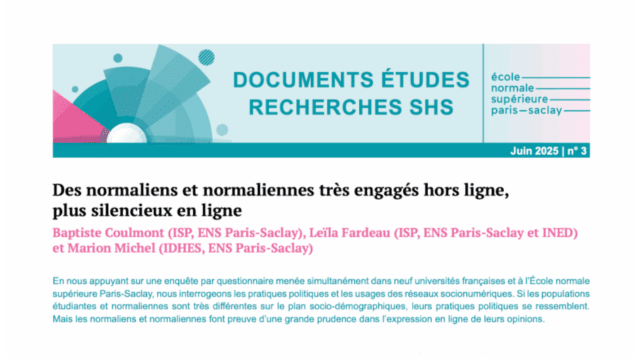A survey of the political practices of graduates of the Ecole Normale Supérieure
A new sociological study sheds light on a paradox familiar to many ENS Paris-Saclay students and alumni: while highly committed in their activities, they tend to remain cautious in public expression. Titled “Highly Engaged Offline, More Silent Online,” the study—conducted by Baptiste Coulmont (ISP), Leïla Fardeau (ISP and INED), and Marion Michel (IDHES)—is based on 245 questionnaires filled out by ENS students, compared to over 5,800 responses from students at other universities.
A hyper-connected yet discreet generation
In an era where social networks are a key platform for expressing opinions, the study highlights a striking trait: ENS students rarely speak out on current issues online. Although 99% are active on at least one platform, only 11% use TikTok, and their responses to major societal debates—sexual violence, climate issues, international conflicts—are consistently lower than those of students from other institutions, sometimes by over 20 percentage points.
A cultivated caution in a distinctive social environment
The authors propose several explanations: a more privileged social background, predominantly scientific training, a strong male presence—but above all, the intense and structuring sociability within the School. This tight-knit environment makes expressing potentially polarizing opinions more delicate. At ENS Paris-Saclay, debate does occur—but offline, in hallways, student associations, or family election nights. Most students see no problem having friends with differing political views, setting them apart from their peers at other institutions.
An implicit norm of discretion
Rather than disinterest, it’s a form of restraint that emerges: a desire to protect one’s professional image, to “separate audiences,” or to avoid engaging in online spaces seen as too noisy or lacking legitimacy. This concern for distinction also shows in platform choice: ENS students favor WhatsApp and LinkedIn, far from the logics of virality and buzz.
A school where engagement takes other forms
One standout finding: the intensity of student life. More than one in two students is active in a sports, arts, union, or solidarity-based association—levels of involvement far exceeding those observed elsewhere. This might be the heart of ENS-style engagement: collective, concrete action over daily digital expression.
👉 Read the full study in the Documents Études Recherches SHS collection:
Issue 3 – June 2025 – PDF: https://saclaydc.hypotheses.org/files/2025/06/2025_03_documents_etudes_recherches_shs.pdf
👉 Read the summary by Baptiste Coulmont: https://coulmont.com/blog/2025/06/02/normalien-reseau/
Interview with Baptiste Coulmont
The study “Highly Engaged Offline, More Silent Online” was led by sociologist Baptiste Coulmont, professor at the Institut des Sciences Sociales du Politique (ISP, CNRS, ENS Paris-Saclay, Université Paris-Nanterre). Alongside Leïla Fardeau and Marion Michel, he explores the forms of civic and social engagement among ENS Paris-Saclay students compared to their university counterparts. The project received financial support from Université Paris-Saclay as part of an innovative educational initiative that places students at the heart of social science research.
You emphasize that ENS students are deeply engaged offline but more reserved online. Is this unique to ENS or common in other selective institutions?
Other available studies on social media use by students in selective programs usually highlight stronger online engagement. But those are a few years old, and we might be seeing a shift now.
Your study suggests that ENS’s intense student sociability plays a key role in digital restraint. Can we say that, in this culture, the “group” weighs more than the individual?
We asked several questions about association involvement, and ENS students are significantly more active than university students. Being surrounded by people with diverse political views might lead to more cautious online expression. But this is still a hypothesis to explore further: ETUPOL, the core study, focused on social media and didn’t delve deeply into student sociability.
Some institutions now see online engagement as a sign of social responsibility. Could ENS students' caution be a professional handicap?
Probably not. ENS students are much more likely than others to use LinkedIn… and much less likely to be on TikTok, showing that they associate online presence with professional image.
Your results show that climate issues are an exception—ENS and university students react similarly. What does that reveal?
Yes, when asked about online reactions to events (sexual violence, elections, etc.), only climate issues drew equal engagement. That may reflect structural factors—ENS students are often in fields directly impacted by these issues (engineering, civil planning)—or the School’s constant awareness-raising around climate.
Based on your research, would you recommend that ENS support its students more in their digital practices—professionally or civically?
Yes, that could be useful. But not by focusing on the risks of overly strong reactions online. Instead, start from how ENS students already use networks: having a professional account with their name, a pseudonymous account, a “silent” one for reading only, and an “active” one for posting...

Comments0
Please log in to see or add a comment
Suggested Articles




